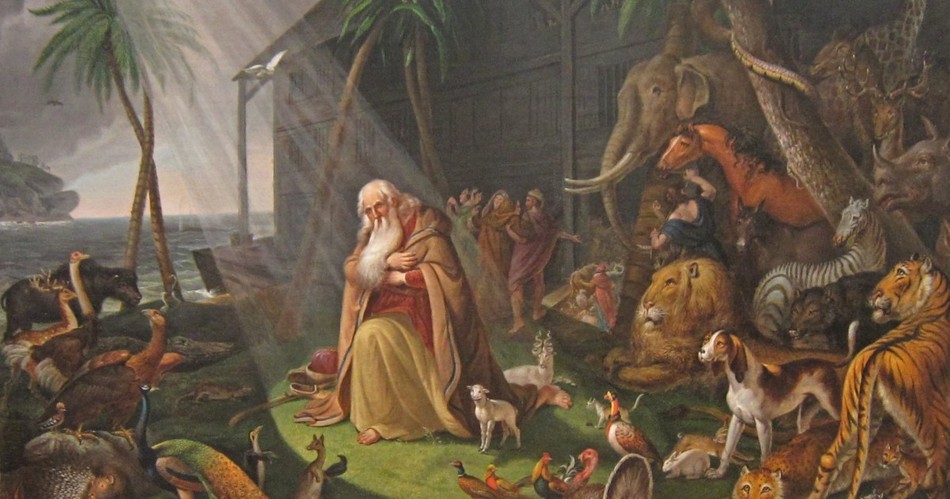Noah, a central figure in the Bible, is renowned not only for his role in the Great Flood but also for his extraordinary lifespan. According to the book of Genesis, Noah lived to be 950 years old, making him one of the longest-living humans recorded in the Bible. This longevity places him among the last of the antediluvian patriarchs, a group characterized by remarkably long lives before the Great Flood.
Noah’s Life and Times
Noah was born to Lamech and became a father at the age of 500. His sons, Shem, Ham, and Japheth, were born when he was around this age, marking the beginning of his significant contributions to biblical history. The most notable event in Noah’s life, the Great Flood, occurred when he was 600 years old. God commanded Noah to build an ark to save his family and a pair of every animal species from the impending deluge meant to cleanse the world of its wickedness.
Noah was six hundred years old when the floodwaters came on the earth. (Genesis 7:6)
After the floodwaters receded, Noah and his family began anew. They were tasked with repopulating the earth and establishing a new covenant with God, symbolized by the rainbow.
And God said, “This is the sign of the covenant I am making between me and you and every living creature with you, a covenant for all generations to come: I have set my rainbow in the clouds, and it will be the sign of the covenant between me and the earth. Whenever I bring clouds over the earth and the rainbow appears in the clouds, I will remember my covenant between me and you and all living creatures of every kind. Never again will the waters become a flood to destroy all life. Whenever the rainbow appears in the clouds, I will see it and remember the everlasting covenant between God and all living creatures of every kind on the earth.” So God said to Noah, “This is the sign of the covenant I have established between me and all life on the earth.” (Genesis 9:12-17)
Noah lived for an additional 350 years after the flood, bringing his total lifespan to 950 years.
After the flood Noah lived 350 years. All the days of Noah were 950 years, and he died. (Genesis 9:28-29)
The Significance of Noah’s Longevity
The extensive lifespans of figures like Noah have sparked much curiosity and debate. Several theories attempt to explain these extraordinary ages. One perspective is that the pre-flood environment was more conducive to longer lifespans due to factors such as a richer nutrient environment, fewer genetic mutations, and potentially more favorable atmospheric conditions. Additionally, the early human gene pool may have been less corrupted by disease and genetic defects compared to later generations.
Another viewpoint considers these ages as symbolic, reflecting the importance and righteousness of these patriarchs. In ancient texts, longevity could signify divine favor and a life of piety and dedication. Scholars suggest that these ages might be a literary tool to convey these early biblical figures' virtue and enduring legacy.
Post-Flood Changes and Decline in Lifespans
The dramatic shift in human lifespans post-flood is notable. After the flood, the Bible records a gradual decline in ages. By the time of Abraham, who lived to 175 years, and Moses, who reached 120 years, the ages were significantly shorter. This change is attributed to various factors, including environmental shifts, the accumulation of genetic mutations, and changes in human lifestyle and diet.
The reduction in lifespans also aligns with the narrative of a world increasingly affected by sin and its consequences. As humanity moved further from the original state of creation, the physical and spiritual decay became more pronounced, leading to shorter lifespans.
Noah’s Legacy
Noah’s legacy extends beyond his age. He is remembered for his unwavering faith and obedience to God in the face of overwhelming adversity. His life is a testament to righteousness and the importance of faithfulness to divine commandments. The account of Noah also foreshadows future judgments and the promise of salvation for the faithful, themes that resonate throughout the Bible.
In conclusion, Noah’s age at death, recorded as 950 years, remains a significant and intriguing aspect of biblical history. It reflects a time of great lifespans and serves as a point of reflection on the changes humanity has undergone since the antediluvian era. Noah’s story inspires and teaches valuable lessons about faith, obedience, and the enduring nature of God's promises.
Christianity.com's editorial staff is a team of writers with a background in the Christian faith and writing experience. We work to create relevant, inspiring content for our audience and update timely articles as necessary.
This article is part of our People of Christianity catalog that features the stories, meaning, and significance of well-known people from the Bible and history. Here are some of the most popular articles for knowing important figures in Christianity:
How Did the Apostle Paul Die?
Who are the Nicolaitans in Revelation?
Who Was Deborah in the Bible?
Who Was Moses in the Bible?
King Solomon's Story in the Bible
Who Was Lot's Wife in the Bible?
Who Was Jezebel in the Bible?
Who Was the Prodigal Son?



